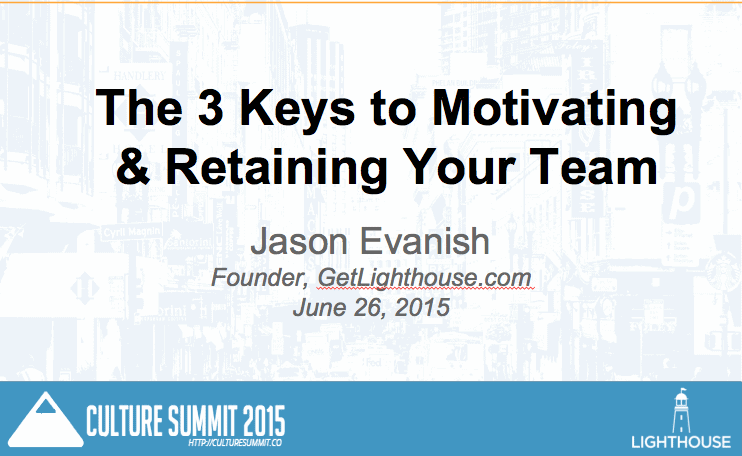What's the difference between managers who have teams that are motivated & engaged, and those whose teams are disengaged and looking for the exit? From our research here at Lighthouse, we've found 3 key habits for managers that separate the two and we shared it in this slide deck today.
I was lucky to be invited to speak at the Culture Summit in San Francisco today, and for those of you that couldn't make it, I wanted to share with you what I talked about.
http://www.slideshare.net/GetLighthouse/jason-evanish-get-lighthouse-culture-summit-deck
There's a lot in this deck and video, so here's a few key talking points I'd like to call out here that you may find interesting and compelling:
1) No excuses. You can be great.
Slide 5 is one of my favorites in any talk I give. It's a simple reminder that it really doesn't matter what the rest of the company is doing; you can be a great manager and lead your team well anyways. Don't let excuses and circumstances get in the way of taking care of the people you can.
You have nothing but great things to gain by doing this:
- People will want to transfer to your team if you stand out as an above average leader in your org.
- Your team will stick with you even if things are difficult in the rest of the company.
- When you move on in your career, there will be people ready to work with you again.
As you read through these slides on things to do, realize that you are in control. You can decide what it's like to work on your team.
2) Good people choose to work at your company.
As Rich Lesser (slide 6) states so well, good people make a choice to continue to work at your company. When people are unhappy, they will vote with their feet and leave. This is a key mindset shift from thinking it's a privilege to get a paycheck from you, to realizing how important a belief in servant leadership is to retaining your best people.
3) Rapport is the foundation for everything.
Without trust and a true rapport with your team, nothing else matters. Your team won't come to you with problems they need help with, they won't open up to you, nor respect and respond to you.
Building rapport means getting to know the motivators and drivers of your people. It means treating them as more than a cog in your machine. As the data shows in the slides on rapport, it's essential your team feels they can come to you with anything. Or put another way:
"People don't care how much you know, until they know how much you care" - John C Maxwell, leadership coach and best-selling author
4) The Steve Kerr story.
Steve Kerr (slide 15) is a rookie coach of the now NBA Champion Golden State Warriors. We have a whole post on the amazing leadership lessons from his work this year, and one of them is of course about rapport. From our post on Linkedin:
"Build trust, build a relationship before you try to make any changes."
This is a quote straight from Kerr. He took over a team with a generally well-liked coach that was fired last season. The team made the playoffs and their best player was widely viewed as a rising superstar in the NBA.
If Kerr had just come in and started changing things, the team would not have listened. So instead, Kerr focused on building relationships, or rapport, with each member of the team by flying to visit them at their homes during the offseason to show he cared about all of them, not just his stars. He also used it as an opportunity to see what they were doing that was already working that he could incorporate into what he wanted to do. Listening has always been a two-way street for Kerr.
You can also read our story on "The Impact of $10" on our Linkedin Pulse series.
5) Fixing problems means having great 1 on 1s regularly.
Ben Horowitz was willing to fire people for not having them. Andy Grove considered them an investment with a greater than 10X return. We've written extensively about their value and how to make the most of them. No matter where you are in the process of 1 on 1s, we have a post for you to consider and supplement what you see in the talk:
- 21 Reasons why you should have 1 on 1s with your team.
- How to start 1 on 1s with your team.
- Common mistakes hurting your 1 on 1s.
- Why your 1 on 1s should not be status updates.
- Why you need an agenda for your 1 on 1s.
6) Open door policies don't work.
Getting interrupted all the time is a distraction and can make for some difficult situations where you're not in a good position to deal with what you're suddenly presented with. More importantly, you won't hear what you need to from your team as Ed Catmull learned (slide 27). Never mistake an open door policy with a replacement with 1 on 1s.
7) A story: Surprise goal, surprise results
Since you probably don't know what slide 34 is about, here's a quick cover of it: I had a former team member come to me and ask for help becoming a product manager. At the time they filled a key business development role. So, I helped them learn the skills of a product manager on the side while they continued in their current role.
All I did was buy her a couple of books, spend 30-60 minutes a month talking about her questions about product, and introduced her to some good product managers I knew. She did the rest and did a great job in her business development role. By helping her achieve her goals, I got a happier, motivated employee, even though the work was different than her main job.
---
If anything is unclear from our Culture Summit deck, please leave a comment and I'm happy to clarify. Hopefully, it inspires a few new ideas for how you can lead and motivate your team. And if you're looking for help following these best practices, sign up at GetLighthouse.com





